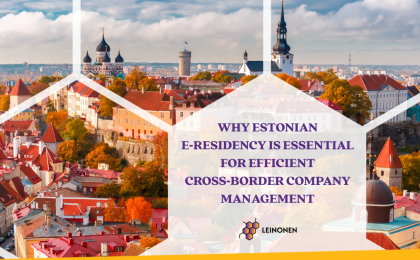It is quite common for many employers that their employees travel to different countries to carry out their duties. Business trip and posted worker are the concepts that are often used in connection with such travel of employees. At first sight, these may seem to be the same thing, but in reality they are different concepts with different legal meaning and consequences. In this article, we briefly introduce both concepts and the importance of distinguishing between them due to the consequences for the employer.
The concept of business trip arises from the Employment Contracts Act (töölepingu seadus, TLS). According to subsection 21 (1) of TLS, business trip is a situation where an employer sends an employee outside the place of performance of work prescribed by the employment contract in order to perform duties. A business trip may be domestic or it may be a business trip abroad. A business trip, for example, is a situation where an employee working in Tallinn under the employment contract is sent to participate in a conference in Riga. In the case of a business trip, the employer must compensate for expenses relating to the business trip and, in the case of a business trip abroad, pay a daily allowance.
The concept of posted worker arises from Directive 96/71/EC of the European Parliament and of the Council. A posted worker is an employee who, for a limited period, carries out his or her work in the territory of a Member State other than the state in which he or she normally works. Thus, unlike a business trip, the concept of a posted worker applies only to a situation where the employee is posted to another country. It is also possible that an employee is on a business trip and a posted worker at the same time, as these concepts are not mutually exclusive.
The main difference between the concepts of business trip and posted worker is the existence of a receiving entity in the latter case. A receiving entity exists in the following three situations:
1) an employee is posted to work abroad at the expense of the employer and subject to the employer’s management and control, under a contract concluded between the employer and the employer’s customer operating in another country;
or
2) an employee is posted to work abroad at the employer’s branch or an undertaking belonging to the same group as the employer;
or
3) an employee is posted to work abroad and the employer is a legal person or sole proprietor acting as a temporary employment undertaking or placement agency.
It is also important that this cannot be a permanent situation, i.e. the employee does not move permanently to work in another country, as a result of which the place of work under the employment contract changes. Thus, an employee is a posted worker, for example, in a situation where an Estonian employer temporarily sends an employee to work on the construction site of the employer’s contract partner in Finland.
Unlike a business trip, it is important for the employer to know that in the case of a posted worker the employment contract may be governed by the law of the country of destination with regard to certain working conditions if these are more favourable to the employee. The purpose of the regulation of posted workers is to ensure the protection of workers posted to another country by giving them the same rights as those applied to the workers in the country of destination. The potentially applied working conditions of the country of destination include, inter alia, the regulation of wages and salaries as well as working and rest time. The detailed conditions are laid down in the national legislation of the country of destination. Thus, in a situation where an Estonian employer sends an employee to a receiving entity in another country, the employer must take into account that the employment relationship may be partially subject to the law of the country of destination. Therefore, before sending an employee abroad, it is reasonable to first determine whether the employee is a posted worker and, if so, to examine the working conditions of posted workers in the country of destination and, if necessary, to apply them. This preliminary work reduces the risk of possible labour disputes in the future.
In the case of employees posted to Estonia from a foreign country, the foreign employer must guarantee the employee at least the working conditions provided for in the Working Conditions of Employees Posted to Estonia Act (Eestisse lähetatud töötajate töötingimuste seadus, ELTTS). However, if the law of that foreign country is more favourable as regards these conditions, the law of that foreign country must be applied. Employees posted to Estonia must also be registered with the Estonian Labour Inspectorate before starting actual employment. The Estonian Labour Inspectorate is also entitled to exercise supervision over the working conditions of posted employees.
If you need further advice and assistance in the area of posted workers, Leinonen’s legal advisers are always on hand to help.
Author: Helen Kaur
Position: Legal Advisor
E-mail: helen.kaur@leinonen.ee



